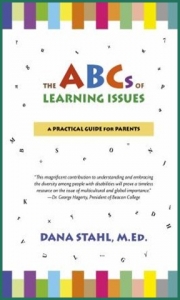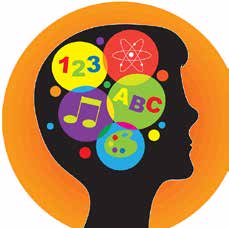
Why Does My Child Have Trouble Going From Initiation to Completion of Tasks?
Executive Functioning Skills include basic cognitive processes that involve a part of the brain called the frontal lobe. This part of the brain helps people pay attention, manage their time and their emotions.
Children who struggle with executive functioning skills have difficulty with the initiation and completion of tasks, solving complex problems, and regulating their own behavior. These children may appear scattered, forgetful, and inattentive. Maintaining sustained attention is challenging and time management and organization is close to non-existent. The ability to go from initiation to completion of tasks is wrought with challenges for children with deficits in executive functioning skills.
The following learning issue on executive functioning skills is reprinted from my book, The ABCs of Learning Issues. available through Amazon.

Clinical definition
Executive functioning skills are a set of cognitive processes that are necessary for controlling one’s own behavior in order to achieve a goal. Executive functioning skills include basic cognitive processes that involve a part of the brain called the frontal lobe. This part of the brain helps people pay attention, manage their time and their emotions. Executive functioning allows people to make good decisions by either promoting or inhibiting certain behaviors. Higher order executive functions require the simultaneous use of multiple basic executive functions.
Educators’ definition
Executive functioning is a series of mental skills that help the brain organize and act on information. Executive functions are necessary for
people to pay attention, hold onto information, block out irrelevant stimuli, organize and prioritize information, and initiate tasks.
What do these definitions mean?
People who struggle with executive functioning skills have difficulty with the initiation and completion of tasks, solving complex problems, and regulating their own behavior.
Which behaviors may parents observe if their child demonstrates this learning issue?
• Your child might appear scattered, forgetful, and inattentive.
• Maintaining sustained attention is challenging.
• Time management and organization is close to non-existent.
• Your child might act before thinking through the consequences of
his behavior, and therefore he might get into trouble fairly often.
Which professionals can treat this learning issue?
• Learning specialists
• Classroom teachers
• Parents
Which teaching strategies can be effective in school?
• Create a structured learning environment and approach assigned tasks with sequential steps that have a logical order.
• Provide students with an outline of the lesson.
• Use weekly planners that break assignments down into small tasks.
• Check in frequently with students to make sure they understand the work.
Which strategies can help at home?
• Time management and routines are essential.
• Use calendars to plan for weekly and long term assignments.
• Assist in the initiation of assignments. Offer support during the completion of tasks, and help your child assess for thoroughness and accuracy.
• Use tools like calendars, smartphone apps, and alarm clock reminders to help your child remember appointments, assignments, and planned activities.
Need help understanding your child’s learning issues?
Read The ABCs of Learning Issues by Dana Stahl M.Ed.
- Understand what your child is experiencing and how it affects their learning
- Learn the meaning of terms educators and professionals use

Do you have a Question About Your Child’s Learning?
Ask Dana; Dana Stahl M.Ed answers your questions
- Post a confidential question through the EA website
- Dana will provide an answer and suggest next steps


